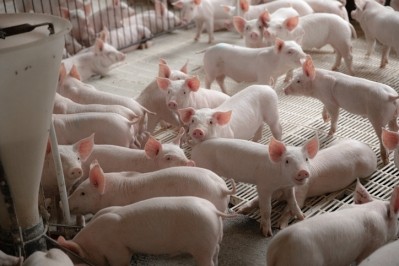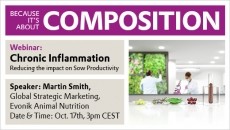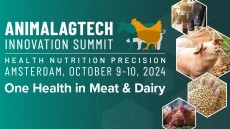Startup recycling nutrients from sewage for feed is in the running for the Food Planet Prize 2023

The contenders offer a wide range of solutions to help move global food production towards a more sustainable, nature-positive, and climate-friendly future, said the Swedish organization.
“Approaching the challenge from different creative angles, they all aim to deliver solutions for reshaping a global system that is currently exhausting the resources of the planet on which it depends.
“Ranging from systems change thinking to new technologies, most of these solutions also take a holistic approach that considers social issues plaguing farmers at the bottom of the food pyramid as well as the fundamental connections between agriculture, climate change and biodiversity. Most importantly, all nominees on the shortlist have great potential to deliver lasting and wide-ranging impact.”
The Food Planet Prize winner will be selected by a jury of food system specialists located on four continents, chaired by Professor Johan Rockström, director of the Potsdam Institute for Climate Impact Research, and Magnus Nilsson, the director-general of the Food Planet Prize. The victor will be announced on June 9, 2023.
Two of the nine shortlisted Food Planet Prize nominees this year are animal feed relevant: EasyMining and the Protein Challenge Southeast Asia.
Recycled nutrients from sewage
EasyMining says its Ash2Phos process—which involves treating sewage sludge ash with a series of chemical reactions employing hydrochloric acid, alkaline, and lime—can recover 90% of the phosphorus in sewage sludge ash, with a more than 96% reduction in contaminant heavy metals such as cadmium and uranium.
The main substance it recovers is calcium phosphate—equivalent to mined rock phosphate, but with higher purity (mined Moroccan phosphate for instance is high in cadmium).
The developer also claims the process has lower carbon dioxide emissions compared to sourcing virgin resources. A life-cycle assessment study by the IVL Swedish Environmental Research Institute concluded that producing the same amount of calcium phosphorus from ash with the Ash2Phos process compared to sourcing it from non-renewable phosphate ore would save 20,000 tons of carbon dioxide annually.
The first Ash2Phos plants—the first in the world that will recover phosphorus at this scale—are in development in Germany and Sweden. The German plant, in Schkopau, is a partnership with utilities company, Gelsenwasser, and is projected to be completed in 2024.
That is the recovery side; regulations make the market side a greater challenge. There are three potential routes for the recovered phosphorus that EasyMining obtains: fertilizer, animal feed, and food additives.
While the EU is facilitating a move to a circular economy, there remains a legal barrier to achieving this because current EU laws prioritize origin, rather than quality, of phosphorus and other recycled nutrients. According to EU feed legislation, it is currently forbidden to use recycled nutrients from sewage for feed raw materials, regardless of their quality.
Feed phosphate
A collaborative project to evaluate the usage of recycled phosphorus produced by EasyMining’s Ash2Phos process demonstrated that the phosphorus recovered from incinerated sewage sludge works as a feed phosphate for livestock, said the company.
The results show that the trials worked, and for the first time it is now possible for the market to have a recycled and sustainable feed phosphate with low climate impact, reported EasyMining.
In both studies, growth for all animals was as expected and showed no noticeable difference on any of the diets, it continued. For the pigs, the estimated total tract apparent digestibility (TTAD) of phosphorus in the PCP was 60.4% and 83.8% of the phosphorus in MCP. For the chickens, the estimated ileal digestibility of phosphorus in the PCP was 58.4% and 75.1% of phosphorus in the MCP.
The company said the testing also showed that the PCP has a digestibility that is slightly lower than MCP but says it is in the same range as other feed phosphates and that there are also additional parameters considered for feed phosphates, such as price, total environmental impact, CO2 emissions and use of the manure.
Legislative obstacles
EasyMining, which is owned by the waste management and recycling group, Ragn-Sells, has initiated another project in collaboration with and the Swedish National Veterinary Institute (SVA) that will assess the risk of the entire value chain for recycled feed phosphate.
The Lantmännen Research Foundation is also providing financial support for the initiative, which aims to influence and highlight the legislative obstacles that exist for recycled nutrients to the EU Commission.
"We believe and hope that the results of this project will be an important part of the work to open up legislation for feed originating from sewage. We want to show that ash from incinerated sewage sludge can be a safe raw material for phosphorus recovery by setting high demands on incineration," said Sara Stiernström, product manager at EasyMining.
Since Russia's invasion of Ukraine, Swedish agriculture has been hit hard by cost increases for important input materials such as phosphorus, noted the developer. Sweden is entirely dependent on other countries to meet its phosphorus needs in agriculture. Much of the phosphate mined and used in Europe today is imported from Russia and Morocco. In addition, extractable phosphates are a finite source, it said.
“If we are serious about creating a sustainable society, we must use the resources we have, over and over again, as often as possible. Therefore, this project becomes important to be able to meet the increasing demands for resource efficiency and Sweden's (and Europe's) path towards becoming more self-sufficient in phosphorus,” added Stiernström.
Protein Challenge Southeast Asia
Protein Challenge Southeast Asia is another nominee for the environmental award. It is rethinking the entire protein production system in the region.
Why does the region require such a focus? Well, according to Forum for the Future, the organization behind the project, global meat consumption has nearly doubled in the past 30 years from 174 to 337 million tons, and nowhere has this been more pronounced than in Asia, where demand rose by 63% between 2000 and 2019. That figure, by comparison, is less than 8% for North America, Europe, and Latin America.
The backbone of the Protein Challenge lies in bringing together and fostering ‘protein visionaries’— stakeholders who share a similar goal of what the region’s future food system could look like.
The visionaries are as diverse: farmers growing animal- and plant-based protein; food tech companies developing products derived from insects, microbes, and other alternative protein sources; investors; and policymakers. Their ranks also include affiliated entrepreneurs like Soil Social, who do not necessarily produce proteins per se but support their growth by helping to maintain healthy ecosystems.
“We need to scale up plant-based diets and reduce animal protein production and consumption significantly for reasons such as its carbon footprint, animal ethics, and antibiotic resistance,” explained Forum for the Future’s Madhumitha Ardhanari, who leads the initiative. “However, it would be too narrow to only look at plant-based and alternative proteins in a region where so many smallholder livelihoods are dependent on animal agriculture and where demand for animal protein—especially seafood—is increasing, both for consumption and export.”
Nigerian Cold chain company, ColdHubs Limited, won the 2022 Food Planet Prize for its 100% solar-powered cold storage facilities to preserve fruits and vegetables for more than 20 days. The African firm emerged the winner alongside Global Mangrove Alliance.


















